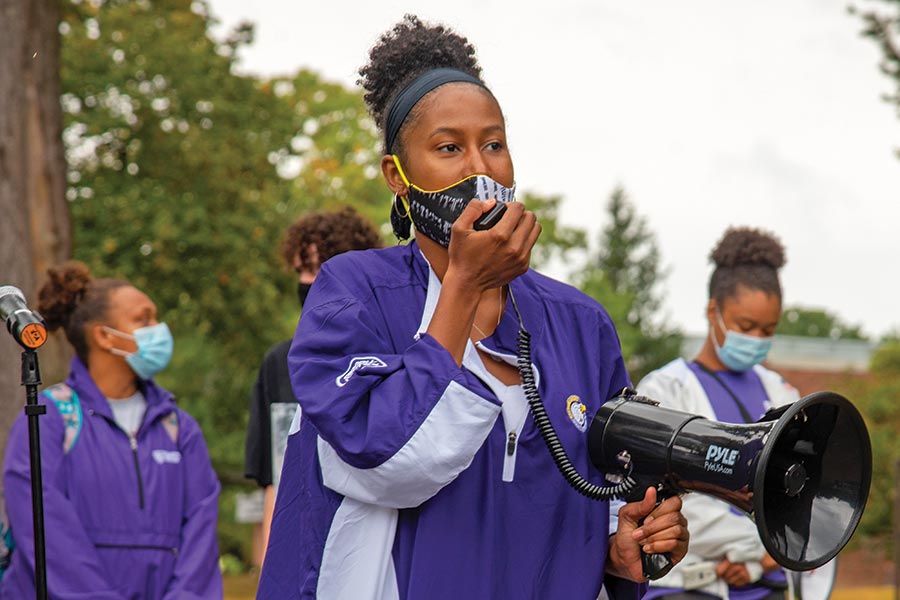LIFE OF THE MIND
Creating an Anti-Racist Campus: Now Is the Time
The principles of Nazareth's founding intersect with a call to action from current students.
by Lisa Durant-Jones, Ph.D., and Jamie Fazio ’97, M.Div.

In September 2020, the student-run organization BLM at Naz led students in a march across campus in support of racial equity. Liliam Montilla ‘21, was one of the event organizers.
When 22 Nazareth students, faculty, and staff embarked on the Civil Rights Solidarity and Social Justice retreat in January, none of us could have imagined the events that would unfold in the months ahead — that our country’s consciousness would be sensitized once again to issues of social injustice, systemic racism, and the critical importance of social activism — or how the civil rights era lessons for creating meaningful change would be critically relevant as individuals and institutions grapple with their place in the system.
Why is it important to engage in conversations about anti-racism at Nazareth College?
The first reason is that to be anti-racist is one of Nazareth’s originating values. Although the term “anti-racist” is new, the sentiment behind the term is rooted in the tradition of advocating for social justice. The importance of anti-racist work was a guiding value of Nazareth’s founders. In 1924, the Sisters of St. Joseph (SSJ) founded Nazareth in response to discrimination against the immigrant population, which had resulted in Catholic women’s being denied access to higher education. Again in the 1940s, Mother Rose Miriam Smyth, in a response that we would describe today as an act of allyship, founded Good Samaritan Hospital in Selma, Alabama — the only hospital in a nine-county radius that would serve African-American patients. For almost 100 years, Nazareth has educated students by preparing them for a career while empowering them to use their gifts and talents to build up a just society. A Nazareth education means graduates will not be bystanders when it comes to issues of social justice; rather, they will be active agents of change. The SSJ believed all Nazareth graduates had a responsibility to live in solidarity with their neighbors, be aware of the needs of their community, and respond accordingly.
The second reason is simply: our students. They are calling for more. They are asking for substantive change, and they’re challenging the systems that have failed to produce it — which, though it’s painful to admit it, includes institutions of higher education like Nazareth. Despite a decade-long trend of express commitment to diversity, equity, and inclusion — showing up in the form of eloquently and carefully worded statements of inclusion, well-crafted strategic plans, and resolute task forces — a truly just, diverse, and equitable campus environment continues to elude most of these institutions.
But now, in these months following the killing of George Floyd, Breonna Taylor, and numerous others, we’re seeing a resurgence in student activism and agency that challenges us to commit to actions that will increase three things: access to higher education; campus diversity of students, faculty, and staff; and creation of curricula and co-curricular experiences that engage us in reflective and critical dialogue about issues of inequity, oppression, and systemic racism.
This movement requires all of us to examine our personal and professional values when describing what a truly just and equitable campus community should look like. It requires us to reject the neutrality, apathy, ignorance, fear, and comfort with the status quo that have stopped us from previously creating the change that our students are asking for. If we wish to leverage this moment, we need to be willing to peel back the wounds, expose the hurt, and then truly commit to healing — in actionable, measurable form.
We see a groundswell of individuals from diverse backgrounds acknowledging the importance of being an anti-racist. This work is not easy. Ibram X. Kendi states, “Pain is usually essential to healing. When it comes to healing America of racism, we want to heal America without pain, but without pain, there is no progress.” Our country and our local community have experienced enormous pain in 2020, and we are hopeful that we will see progress as we work through it, individually and as a collective community.
Lisa Durant-Jones is the vice president for the Community & Belonging Division. Jamie Fazio ’97 is the director for the Center for Spirituality.